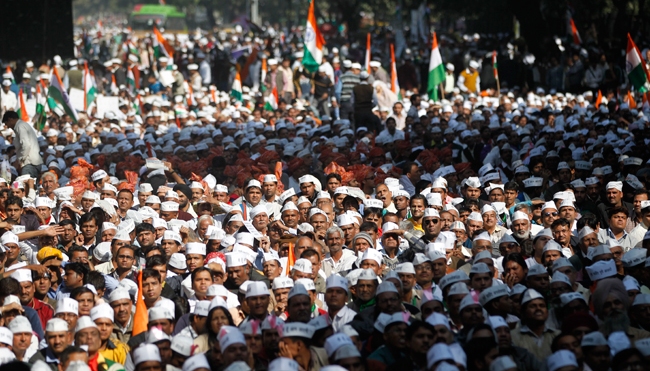By Anshu Lal,
Is any change good change? This is a question Indians urgently need to ponder over on the brink of the General Elections which will take place in 2014. The United Progressive Alliance (UPA) bitterly disappointed the people in their second term of governance.
Compared to the previous infamous scams like the Bofors and the Harshad Mehta scams which involved losses of Rs. 64 crores and Rs. 5000 crores respectively, the 2G and coal scams, which were exposed during the current government regime, cost the nation Rs. 1.76 lakh crores and Rs. 1.86 lakh crores, making the other scam losses look negligible. With the presence of other scams like the Commonwealth Games and Agusta helicopter scams and the hopelessness from the opposition which seems to display similar problems as those with the government, the people clearly desire change.
It is at this crucial time that the Aam Aadmi Party (AAP), under the leadership of activist-turned-politician Arvind Kejriwal, decided to enter politics with new candidates and absolutely no allegiance to any powerful political party so far. Thus, a new front which specifically focuses its resources against corruption has emerged for the people, at a time when people are frustrated with the deep-rooted corruption that seems to be prevalent in every other political party. Quite naturally, the AAP has become a strong political contender with substantial public support and a lot of media attention. But does it deserve all the hype? Can the AAP really change the face of Indian politics?
The origin of the AAP can be traced back to August 3, 2012 at the Jantar Mantar in New Delhi when Arvind Kejriwal decided to break his fast which began on July 25 and was held to protest corruption and the unwillingness of the government to pass the Jan Lokpal Bill proposed by Team Anna. It was on that day that Kejriwal announced that he would enter politics.
Kejriwal had earlier announced that the July 25 fast would be a ‘fast till death’ if his demands were not met. However, it took only ten days for him to go back on his word. Instead of keeping his resolve and showing that he was not bluffing, Kejriwal made a joke out of the ‘fast’ by conveniently deciding to end it when public support began diminishing. Moreover, his heroic announcement about entry into politics raises an important question. Why couldn’t Arvind Kejriwal join politics earlier and avoid holding a fake fast which ended when he got scared that he might actually have to die to get the attention he craved for?
Therefore, it is ironical that a party which claims to be an honest crusader against corruption originated from an event based on sly tactics, deception and escape mechanisms. Moreover, this was not the only time when Kejriwal pulled a stunt like this.
On March 23, 2013, Kejriwal began yet another fast opposing the supposedly inflated bills of water and electricity that the people of Delhi had to pay. After 15 days, he abruptly ended his fast. His reason was that the issue of inflated water and electricity bills would instead be raised in the Delhi assembly elections taking place now. The entire point of going on a fast is to show people that one would rather face indefinite starvation than tolerate the issue which one is fasting against. Kejriwal turned one of Gandhi’s most powerful last resorts into a series of temporary and pointless gimmicks. All these events certainly lead to a doubt over the purity of intentions of a political party that claims to be vehemently against corruption.
Another problem with the AAP is that it seems to have ‘a one-point agenda and indicates no radical shift in the way it would carry along democracy and development’, according to the article ‘Aam Aadmi’s Advice to Aam Aadmi Party’ by Paramita Ghosh published on the Hindustan Times website. In other words, Arvind Kejriwal and his allies decided to convert a social movement with the sole agenda of anti-corruption measures into a national political party. Apart from making bold claims about reducing corruption and exposing the scams and wrongdoings of other parties, the AAP has made no positive statement or taken no direct, positive action on any other national issues. What has the AAP said or done about national defence, economy, agriculture, industy, health, education or any of the other national issues? Even though corruption is one of the most important social evils, a national political party cannot focus on solely that issue.
Of course, except the problem of having a one-point agenda, almost all the other national political parties can be said to suffer from similar problems. But this is maybe what the countrymen need to realise. The AAP, with its tall claims of being different, might just turn out to be like any other political party. (Courtesy: indiaresists.com)
—-
Anshu Lal is a student of journalism at the Asian College of Journalism, Chennai, passionate about issues which affect the world and form societal thoughts and opinions. He can be contacted atanshu15192@yahoo.com.






















